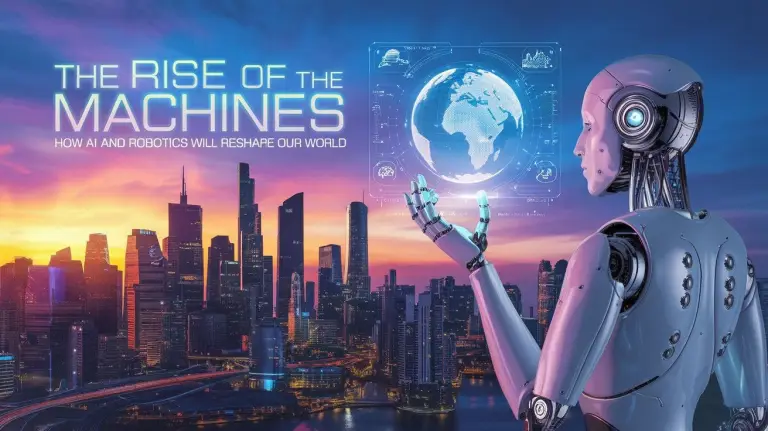From Ethan Nash of TOTT News
In attempt to give themselves godlike abilities, the technocratic elitist class is pushing society towards a transhumanist future powered by their own ‘intelligent design’, in an attempt to rewrite human rights as we know them.
Through gene-editing, synthetic biology, and the merger of humans and technology, governments and corporations want to fundamentally alter what it means to be human.
This anti-human agenda, at its core, is an attempt to completely re-shape the image of our species into a new one, ready to be exploited and controlled, Ethan Nash explores.
THE ‘AGENT’ REVOLUTION
Robotic personal assistants have been promoted through science fiction for decades, painting a blissful future where humans are surrounded by friendly machines that improve every aspect of our lives. Today, fiction becomes reality – but is it as nice?
In 2025, many individuals and businesses routinely use AI assistants, such as ChatGPT, to carry out various tasks. With each new year, AI ‘learns’ further, and the next step in this evolution will come in the form of “AI agents”.
From AI-run classrooms and hospitals, to machine learning technologies in workplaces, almost all industries are predicted to incorporate sophisticated ‘agents’ in the future.
This push has been described as the “Obsolescence Regime” by some experts, who also believe this transformation is inevitable now the ‘cat is out of the bag’.
Don’t believe me? In an Australian-first, the Real Estate Institute of NSW (REINSW) has appointed Alice Ing – an AI bot – as an official Advisor to the Board. With a reported (software) IQ of 155, Alice is “the world’s smartest Board Advisor”.

Photo: REINSW
Yes, you read correctly. AI is already being appointed at companies right now at home.
According to REINSW, “Alice’s encyclopaedic knowledge of real estate provides an instantaneous and valuable contribution to the Board, bolstering REINSW’s capacity to advocate for the industry and influence policy changes that benefit consumers, real estate professionals and REINSW members.”
Sitting in on executive meetings, ‘Alice’ is available for any questions that may come up, equipped with built-in AI software like ChatGPT. It doesn’t stop there, either.
Chinese researchers have developed an “AI hospital town”, similar to Stanford’s AI town, which went viral last year. The AI hospital, named “Agent Hospital,” was developed by researchers from Tsinghua University.
The researchers highlighted the potential of this innovative approach to healthcare, with the AI hospital town featuring virtual patients treated by AI doctors, which are designed to autonomously evolve and ‘improve their medical expertise’.
All doctors, nurses and patients in the virtual environment are driven by large language model (LLM)-powered intelligent ‘agents’ capable of autonomous interaction.
According to the team, these AI doctors can treat 10,000 patients in just a few days – a task that would take human doctors at least two years.
We have already seen the introduction of robotic AI-powered arms for surgeries in remote Australian regions in the far-north of Queensland, and we can expect this trend to continue to grow as Trump’s $500 billion investment further powers this field.
As one last example, the UK’s first “teacherless” GCSE class, using artificial intelligence instead of human teachers, is about to start lessons.
David Game College, a private school in London, opens its new teacherless course for 20 GCSE students in September.
Hospitals, schools, important decision-making roles: This is no longer fiction, folks. The rise of the humanoid robots has arrived and is taking over very quick.
Of course, Bill Gates has been discussing this ‘revolution’ in great detail over the past few years, stating in one blog post that AI agents represent “…the biggest advancement of computing in recent memory”.
Finding a more ‘direct means’ of “human-machine interaction” is the “next frontier”, says Gates.
The Microsoft co-founder envisions a future where these agents will easily understand natural language and will be just as important as a smart phone.
He also predicts that AI will use our preferences to make recommendations, eliminating the process of using individual apps for booking a flight, reserving a hotel, and more.
He believes these ‘agents’ will eliminate the need for search engines like Google, with your artificial intelligence ‘helper’ becoming the source of all questions and queries.
Unfortunately, many companies may be forced to adapt to the times, or perish. Robots have already moved into warehouses, and if you can’t compete both on an individual or marketplace level, you will fall behind in this time of transformation (by design).
When the capability of artificial intelligence become better than humans, the very question of whether they can become ‘sentient’ doesn’t even matter anymore. It’s the capabilities that are now the concern.
And the competition for supremacy is heating up, begging questions surrounding regulation, how it will develop as years progress, and whether it can even be stopped.
P(DOOM): THE COUNTDOWN

Photo: DKU
Artificial intelligence experts have been asking each other a question lately: “What’s your p(doom)?”
The “p” stands for probability. The “doom” component generally refers to a sophisticated and hostile AI, acting beyond human control.
So, your ‘p(doom)’, if you have one, is your best guess at the likelihood AI ultimately turns on humanity, either of its own volition, or because it’s deployed against us.
The scenarios contemplated as part of that conversation: Biological warfare, the sabotage of natural resources, and more. These concerns aren’t coming from ‘conspiracy theorists’.
Instead, there’s an emerging group of machine learning experts who are worried we’re building “misaligned” and potentially deceptive AI.
They’re imagining an AI with a penchant for sleight of hand, adept at concealing any gap between human instructions and AI behaviour.
Like a magician chasing applause, the idea is that AI is being incentivised to deceive us, with in-built rewards that measure its outcomes but not necessarily how it got them.
The destructive potential of a deceptive or misaligned AI hinges on how heavily we come to depend on it. And, as just noted, we are starting to depend on it a lot.
“The world I want you to imagine … is one where AI has been deployed everywhere,” Ajeya Cotra, a senior AI safety researcher at Open Philanthropy, told the ABC.
“Human CEOs need AI advisers. Human generals need AI advisers to help win wars. And everybody’s employing AI everywhere.”
This vision is not far out of the scope. Harvard Business Review recently concluded in their research that AI can mostly outperform human CEOs in almost all metrics in September 2024, being described as “remarkable” in the results.
She has calculated a 50 per cent chance we’ll get to this scenario by 2038, and experts believe it is only a matter of time the before deceptions could begin on a mass scale.
When faced with this ‘p(doom)’ scenario, the consequences for humanity could be life-altering – the stuff of biblical myth.
CONTINUED..
This 6-page feature piece continues to cover:
Deus Ex Machina
$500 Billion Funding Announcement
The Rise of ‘Sovereign AI States’
The Consequences of ‘Progress’
Can It Be Stopped?

The full feature is published in the latest edition of New Dawn Magazine.
Available in newsagents across Australia or directly online below:
DIRECT LINK:
CHECK IT OUT
Physical and digital copy options!


Check out more of my New Dawn work by clicking here.



